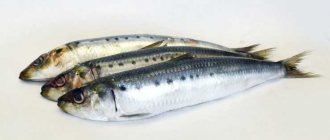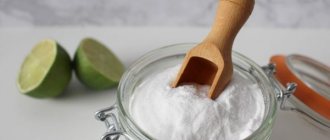How much water does apples contain?
Vegetables and fruits mostly consist of water, which is vital for the body to maintain the proper functioning of all its organs and tissues. The benefits of such liquid, which enters the body from fruits, are beyond doubt. It is quickly absorbed, which eliminates dehydration of the body.
With food we receive about 20% of the body's total daily moisture needs. Many of us are interested in how much water is in apples. This is exactly what we will talk about in this article.
The apple pulp is extremely juicy, and depending on the specific variety, it can be sweet or sour. If you are interested in exactly how much liquid there is in apples, then we can say that it depends on the specific variety of apples. They can contain from 81 percent liquid to 84 percent. As you can see, these fruits perfectly hydrate the body, preventing it from dehydration. Apples are good not only fresh, they can be eaten for food after heat treatment, in the form of preserves, jams and compotes.
It should be said that the water content of apples directly affects their taste characteristics. By decreasing or increasing the liquid content of a grown crop, the taste of the fruit can change significantly. So, for example, during a rainy summer or when the gardener overwaters the plantings, the fruits acquire a watery taste, and the percentage of liquid can increase to 85-88 percent. Such a harvest is poorly stored, and its taste is far from ideal.
How many carbohydrates are in an apple
The apple contains many useful components, including potassium, vitamin C, boron, magnesium, iron and many others. etc. The nutritional value of a fruit depends on its variety, size, growing and storage conditions. It is considered an excellent source of energy due to its fairly high carbohydrate content. Read about the calorie content of apples here.
A green apple contains 9.8 g of carbohydrates per 100 g, a red apple contains 12 g. 1 pc. – 15.7 g and 19.2 g, respectively.
These carbohydrates belong to the group of slow carbohydrates that are beneficial for the body. They contribute to the normal functioning of the pancreas, energy saving, and a uniform increase in blood sugar. Of the complex carbohydrates, the fruit contains dietary fiber and starch, and of simple carbohydrates - sucrose, fructose, and glucose. The energy effect from eating the fruit lasts about 2 hours.
Does the moisture content depend on the variety?
Indeed, the moisture content in apples depends on the specific variety of these fruits. In some varieties, the percentage of water can be 80-81 percent, while in other varieties this figure is closer to 84%.
The peculiarities of planting care should also be taken into account. If a gardener neglects to regularly water the trees, this will negatively affect the yield and quality of the grown fruit. In this case, the fruits turn out to be overdried, tasteless, and contain a minimum of useful microelements.
Grapefruit - Water content: 91%
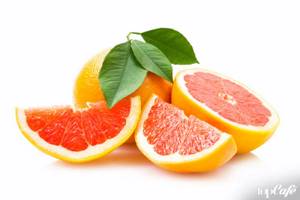
Juicy grapefruit is one of the healthiest fruits. It has a bitter taste, so it is better to eat grapefruit by dividing it into slices and sprinkling them with sugar. Grapefruit juice will also help beat the summer heat.
- Low-calorie grapefruits help reduce weight.
- The high potassium levels in grapefruits will help balance blood pressure.
- Grapefruits are rich in antioxidants that fight cancer.
- Due to dietary fiber, they are good for constipation.
5
How to properly store the harvested crop?
For many of us, the urgent problem is the correct storage of the harvested apples, which will allow us to preserve all the taste qualities of such fruits, their percentage of liquid and other useful microelements.
It should be said that shelf life, that is, the period that apples can be stored, depends primarily on the specific variety of these fruits. Summer or early autumn varieties that ripen in August - September have mediocre keeping quality. You can store them for a couple of months at most, after which they lose their water, quickly become withered and soon rot.
Winter varieties, which ripen in October - November, can be stored all winter. At the same time, it must be said that the duration of storage also depends on providing the fruit with appropriate conditions. It is best to store harvested apples in wooden boxes in a dark, cool place. This is the only way you can retain all the liquid in the apples, and, consequently, the harvested crop will last as long as possible, allowing you to feast on delicious apples all winter until you receive a new harvest.
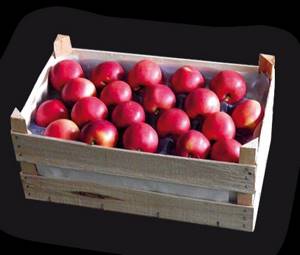
Cucumber
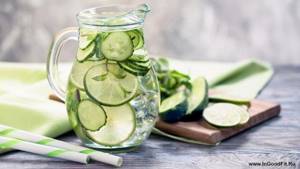
Cucumber is famous for its high water content, as well as additional nutrients such as vitamin C. You can consume cucumbers in a variety of ways: simply eat them, use them in salads. And besides, when combined with water, they make a good drink for removing toxins from the body. And with a delicious taste.
The benefits and harms of apples
Due to their chemical composition, these fruits are among the most beneficial for the human body. They contain numerous vitamins, maintain tone and improve the functioning of the immune system. A variety of trace elements and minerals contained in apples are necessary for the cells of internal organs and tissues for regeneration and normal functioning. That is why nutritionists recommend eating at least one fresh apple per day.
It has been established that these fruits have a positive effect on the body's protective functions. In autumn and winter, when we are plagued by various colds, eating apples containing numerous vitamins, including vitamin C, will be an excellent preventive measure against such inflammatory and infectious diseases. Also, these fruits help to cope with vitamin deficiency, which develops during the cold season, when for a number of reasons we cannot eat fresh, vitamin-rich vegetables and fruits.
Apples contain a large amount of potassium, which is necessary not only for building bone tissue, but also has a positive effect on the condition of the cardiovascular system. It is well known that diseases of the cardiovascular system are the main cause of premature mortality. Eating apples in this case will be an excellent preventive measure against such diseases, which will allow you to lead a full life for a long time without fear for your health.

Apples also contain a large amount of easily digestible iron. This trace element is rarely found in vegetables and fruits, which makes the apple an extremely valuable food product. Iron is necessary for the transport of oxygen through the vascular system, which is why, with a lack of iron, individual organs and tissues experience oxygen starvation, which leads to various problems and serious diseases.
It is extremely important to correctly calculate the amount of water received per day. Calculating how much water you consumed per day is not difficult. It is recommended to drink 30 grams of water for every kg of body. If the water balance is disturbed, both dehydration and excessive hydration can occur, which leads to edema or other problems. Consider the fact that apples contain more than 80% liquid, so you need to calculate the total amount of water your body receives accordingly.
Apples, if used incorrectly for food, can cause serious harm. This is especially true when they are consumed together with seeds. The fact is that the seeds contain iodine and other useful microelements.
However, if they are consumed excessively, the body is poisoned with dangerous hydrocyanic acid. Experts advise eating no more than 5 seeds daily, which will allow you to get the necessary microelements without harming your body with dangerous acids.
Among other things, apples contain active acids that can adversely affect the condition of tooth enamel. The sugar contained in fruits also worsens the condition of the enamel. That is why it is recommended to give preference to sour varieties, and after eating such fruits you should rinse your mouth with cold water.
Tomatoes - Water content: 94%
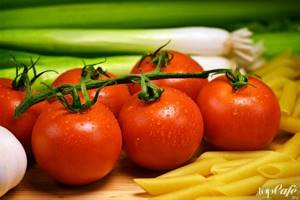
Yes, the tomato is a fruit that is mistaken for a vegetable. This amazing fruit is not only rich in nutrients, but also filled with moisture by 94%. It can be eaten raw or used in salads and sandwiches.
- Vitamin-rich tomatoes reduce the risk of macular degeneration, a disease that leads to vision loss.
- Consumption of tomatoes may reduce the risk of developing hypertension.
- High concentrations of lycopene minimize the risk of cancer.
- Consuming tomatoes daily can improve skin health and protect it from sun damage.
We advise you to read: The main mistakes that even healthy eating gurus make.
1
Does the moisture content depend on the variety?
Indeed, the moisture content in apples depends on the specific variety of these fruits. In some varieties, the percentage of water can be 80-81 percent, while in other varieties this figure is closer to 84%.
The peculiarities of planting care should also be taken into account. If a gardener neglects to regularly water the trees, this will negatively affect the yield and quality of the grown fruit. In this case, the fruits turn out to be overdried, tasteless, and contain a minimum of useful microelements.
That is why it is best to eat not purchased fruits, but apples that are grown independently on a personal plot. In this case, you can be completely sure that the crop you grow does not contain harmful nitrates and is extremely beneficial for the human body.
Watermelons - Water content: 92%
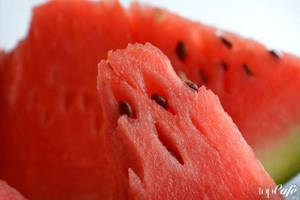
Perhaps the most popular fruit in the summer heat. In addition, watermelon has many other nutrients.
- Watermelon is a rich source of lycopene. This is a phytonutrient that effectively fights cancer cells.
- The high fiber content in watermelons improves digestion.
- Large amounts of vitamin A are good for hair and skin.
- Watermelons are full of healthy vitamins such as A, C and B6.
2
How to properly store the harvested crop?
For many of us, the urgent problem is the correct storage of the harvested apples, which will allow us to preserve all the taste qualities of such fruits, their percentage of liquid and other useful microelements.
It should be said that shelf life, that is, the period that apples can be stored, depends primarily on the specific variety of these fruits. Summer or early autumn varieties that ripen in August - September have mediocre keeping quality. You can store them for a couple of months at most, after which they lose their water, quickly become withered and soon rot.
Winter varieties, which ripen in October - November, can be stored all winter. At the same time, it must be said that the duration of storage also depends on providing the fruit with appropriate conditions. It is best to store harvested apples in wooden boxes in a dark, cool place. This is the only way you can retain all the liquid in the apples, and, consequently, the harvested crop will last as long as possible, allowing you to feast on delicious apples all winter until you receive a new harvest.
A pineapple.

Pineapple is a summer fruit that is widely used in various smoothies and fruit salads. Besides its high water content, pineapple is still the only source of bromelain, an enzyme known to break down proteins in the body. In Central and South America, pineapple has been used for many centuries to treat indigestion and reduce various inflammations in the body.
The benefits and harms of apples
Due to their chemical composition, these fruits are among the most beneficial for the human body. They contain numerous vitamins, maintain tone and improve the functioning of the immune system. A variety of trace elements and minerals contained in apples are necessary for the cells of internal organs and tissues for regeneration and normal functioning. That is why nutritionists recommend eating at least one fresh apple per day.
It has been established that these fruits have a positive effect on the body's protective functions. In autumn and winter, when we are plagued by various colds, eating apples containing numerous vitamins, including vitamin C, will be an excellent preventive measure against such inflammatory and infectious diseases. Also, these fruits help to cope with vitamin deficiency, which develops during the cold season, when for a number of reasons we cannot eat fresh, vitamin-rich vegetables and fruits.
Melons - water content: 90%
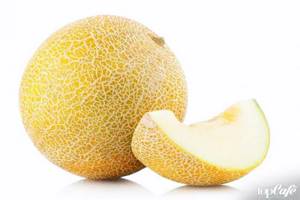
Low-calorie melons are a healthy alternative to desserts. In addition, they are perfect in the summer heat.
- Melon is rich in vitamins C and A, which are essential for strengthening the immune system.
- The high potassium concentration helps balance blood pressure.
- Beta-carotene fights cataracts and helps improve vision.
- Being low in calories, melon can help you lose weight.
6
How much water does fruit contain?
Depending on the type of fruit, the proportion of water content in them also varies. For example, citrus fruits (orange, lemon, grapefruit, lime) contain about 88% water.
In most types of berries, the specific water content ranges from 85 to 86 percent. Raspberries, for example, contain 85% water, cherries - 86%. Currants, being the least juicy of the listed types of berries, contain 82% water.
Some of the most common fruits in our latitudes - apple and pear - contain 85 and 84 percent water, respectively.
Most grape varieties are 80% moisture.
The fruit that contains the least amount of liquid is the banana. The specific moisture content in it is only 75%.
The leadership in specific water content is held by melons and watermelons. Depending on the variety, the portion of liquid in such fruits can range from 90 to 91%.
Peaches and nectarines contain slightly less moisture - about 88%. In fact, pineapple contains a similar amount of water – up to 87%.
Of the common foods, celery contains the most water. This vegetable contains about 95 percent water.
A significantly smaller proportion of water is contained in dried fruits. When dried, the specific moisture content decreases on average three times, and the idea that there is almost no liquid in this product is erroneous. The average water content of dried fruit ranges from 18 to 31 percent, depending on the type. In particular, the most water - about 31% - is retained in dried apricots and figs, slightly less - from 24 to 25 percent - in dried plums and pears. Dried grapes and dates contain 19 to 20 percent water, respectively. The minimum moisture content - about 18 percent - is observed in dried peach and cherry fruits.
This way you can get an idea of the water content of the most common types of fruit. It is worth noting that not all of the listed types are suitable for drying. For example, currants, due to the significant proportion of seeds in the fruit, are not suitable for drying.
Listed below are the nutrient standards that apply to the site.
Quite often, pregnant women hear recommendations from doctors, relatives and just well-wishers about various restrictions in diet, exercise, etc. Particular attention is paid to water during this period. It is believed that you need to limit yourself in the amount of fluid you consume. But is this really so?
Much needed water
Water is life, and all metabolic processes in the body occur in an aquatic environment. The development of new life occurs precisely in the aquatic environment. Even the human body is mostly composed of water. Without water, life cannot exist; even the slightest deficiency has a negative impact on the health and well-being of a person, and even more so of a pregnant woman.
During pregnancy, water is not only extremely important, and its need increases, it takes on a new meaning, since the child is also included in the water-electrolyte metabolism system. A lack of fluid can negatively affect not only the health of the mother, but also the child, but excess water in the body turns out to be even more unpleasant.
Already from the very first days of pregnancy, blood pressure may drop and constipation may appear. But few people think that the problem lies in a simple lack of fluid. And with a balanced drinking regime, all problems disappear!
In the absence of water, metabolic processes in the mother's body are disrupted, toxicity increases, symptoms may include excessive irritability, fatigue, nausea, etc. With the help of water, metabolic products are eliminated. In addition, some medications - vitamins, minerals - require sufficient amounts of water for better absorption.
Cucumbers - Water content: 96%
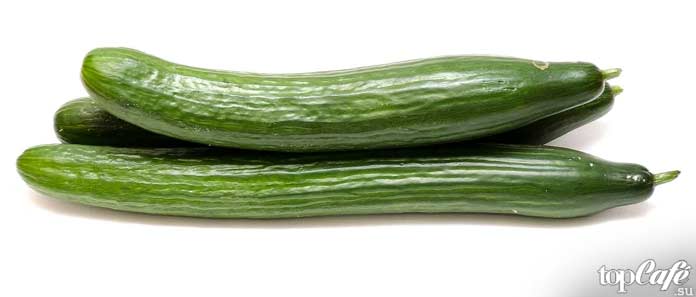
Cucumber has the highest moisture content (96%) of all other fruits. It is ideal in the summer heat. Cucumber salad will help you quickly restore strength. According to topcafe.su, cucumber juice is one of the best means for detoxifying the body.
- Cucumber juice helps remove toxins from the body.
- The high amount of fisetin in cucumber affects brain health.
- Fiber improves digestive functions.
- Cucumber slices help reduce dark circles under the eyes. A face mask using cucumber juice improves skin color.
- Eating cucumber may reduce the risk of kidney stones.
Excess weight, wash away!
How does plain water help you lose weight? Firstly, it contains 0 calories, and at the same time, as studies have shown, drinking 2 liters of water per day causes energy expenditure in the body of approximately 400 kJ. Secondly, water improves digestion and cleanses the body of toxins, of which 2 to 4 kg can accumulate in the digestive tract. Third: the liquid helps process fats and proteins, and generally normalizes metabolism.
And finally, it is water that helps us distinguish between the feelings of hunger and thirst. It turns out that very often we confuse them. Testing your appetite is easy: you just need to drink a glass of liquid. Usually, about 10 minutes after this, the desire to eat disappears, because the body was just asking for a drink.
The usual drinking regimen is 2–2.5 liters of water per day. But to lose weight, the amount of fluid needs to be increased. For every kilogram of body weight there should be 30–40 ml of water. Accordingly, if you weigh 80 kg, you need to drink about 3–3.2 liters per day. It is better to sit “on the water” in the summer, when some of the liquid is lost along with sweat, and therefore the kidneys and bladder are less overloaded. In addition, if you do this in winter, the excess fluid in the body will make you feel very cold. However, before trying a water diet, you need to consult with your doctor and find out whether your heart, kidneys and gastrointestinal tract can withstand such a load.
Grapefruit

Grapefruit is low in sugar and high in enzymes, enzymes that help break down fat. Enjoy it for a healthy breakfast or add it to water to add a distinctive flavor and aroma to your drink.
You will say that I did not mention all products containing water . And it is true. But we agreed on the ten most effective ones. As for the rest. Use products containing water and do not forget that in addition to saturating the body with water, they bring health to your entire body.
